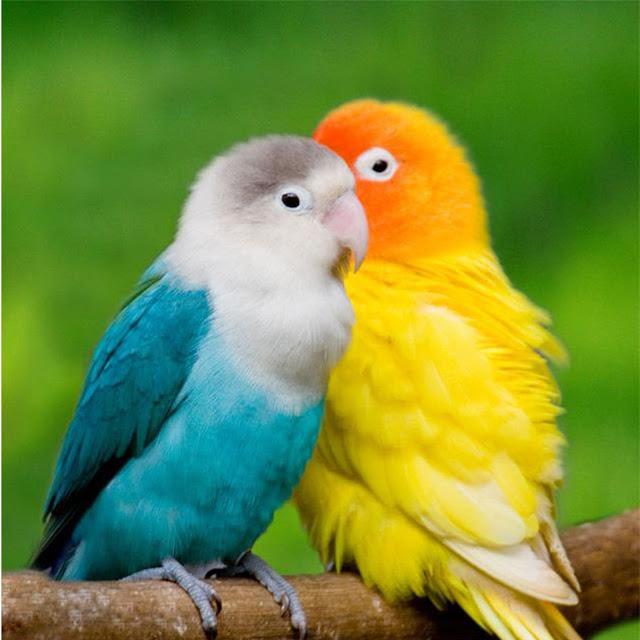Bird Cages:
Rectangular cages are best because they offer space for a lovebird to fly back and forth as it would naturally do if it lived out in the wild. . A minimum of 32 x 20 x 20 (81 x 50 x 50 cm) per pair of birds is recommended with about four perches, feed and water dishes and an area for a bath. When you use a small cage, you must let your pet out daily to fly around.
 |
| Peachy and Turq Love Birds |
If you are housing pairs of lovebirds here are a few guidelines: Try to house only one species of lovebird as mixing species can cause serious fights. House either one pair of lovebirds or three pairs, never two pairs or there will be fighting. Each pair needs about 35 cubic feet of space. Lovebirds need a good night's rest of about 10 to 12 hours, so cover the cage at night to block out light.
Bird Perches:
Provide one or two perches about 3/4' in diameter and dishes hanging from the side for feed, water, and grit. Try to place the perches away from dishes so the food and water dish do not become soiled with bird droppings. Do not use plastic because your bird will chew and break the plastic and it can become hazardous.
Tree branches of a similar size make good perches and will help to wear the claws down naturally. The ideal size range for a lovebird's perch is three-fourths to one and one-half inches. It's best to use several hardwood perches that aren't easily chewed, as well as one cement conditioning perch to keep the nails and beak trimmed.
Bird Hide / Nest Box:
Lovebirds like special resting places. Nest boxes placed up high, all at the same level and all of the same type work well and help prevent fights.
Aviary:
A roomy indoor aviary, a bird room, or an outdoor aviary (depending on your area) are all good choices. The aviary needs plenty of light and fresh air. The outdoor aviary needs to have a protected shelter that can be heated and cooled where necessary. Flights are recommended to be a minimum of 6' x 6' x 3' (183 x 183 x 91 cm) with plenty of perches or branches at least 1 1/2" (15 cm) thick.



Post a Comment